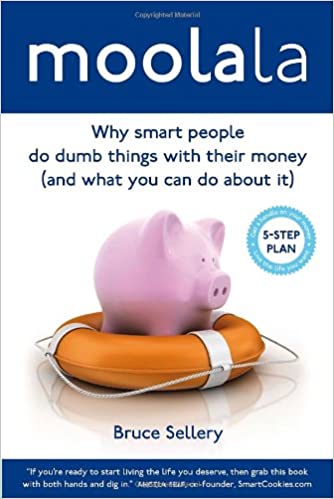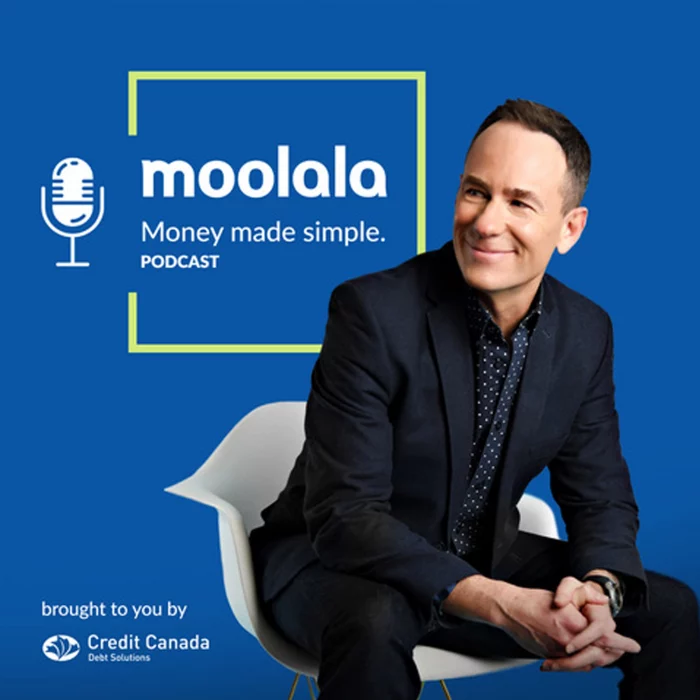Bruce Sellery Knew This Was Coming

How can a book that predates 2022 for more than a decade be more meaningful than ever? Our answer is that Bruce Sellery knew financial technology was going to result in the continued abstraction of money when he wrote Moolala: Why Smart People Do Dumb Things With Their Money (And What You Can Do About It). It delivers some almost clairvoyant advice on how to avoid getting distracted by financial products and tools whose complexity don’t match your personal financial circumstances. Doesn’t that sound like the kind of help we could all use, when the financial headlines are filled with so many new and difficult to understand terms?
Money has become something we hardly see or touch before using. Even buskers in New York City’s Central Park now accept electronic payment. (Those are PayPal and Venmo handles displayed beside the empty instrument cases pictured above; the place where passers-by used to show their appreciation with dollar bills.) You’ve almost got to be over 40 to remember going to the store and only being able to buy what the money in your actual pockets could pay for. And it’s pretty hard to get through a week of news without coming across words like cryptocurrency, bitcoin, ethereum, nonfungible tokens or meme stocks.
For this reason alone Moolala the book feels almost purpose-built for the 2022 New Year. How so? The quick answer is that when there are so many more ways to get into financial hot water, ensuring there isn’t a mis-match between your personal financial circumstances and how you use money matters more than ever. Which is why you will want to familiarize yourself with the “Priority Pyramid” discussed in Chapter Four. It was specifically designed to help people avoid overly complex financial decisions and tools
There are so many new financial tools available, it might be harder than ever to ensure there isn’t a mis-match between your personal financial circumstances and the complexity of how you use or organize your money. Moolala helps you avoid that mis-match, and the stress it creates.


Bruce has been inspiring people to get a better handle on their money to live the life they want for decades. His book teaches us that keeping our personal financial roadmaps grounded in the trip through life we want, makes it a whole lot easier to avoid overly complex and unhelpful distractions along the way.
In fact, Moolala is filled with easy-to-understand instructions on how to build a plan that cannot help but improve your relationship with money. For example, we love the comparison of your current financial situation to the “Point A” required for Google maps to give you directions to “Point B”. The app literally needs to know where you are, in order to give you directions for where you want to go, and so it is with money says Bruce. “How can you get to where you want to be, if you don’t know where you are starting from?”
We also really like Mr. Sellery’s rejection of what he feels is too much focus on preparing for retirement. Our entire adult lives are not only a path to retirement. So Bruce suggests exchanging the idea that there are merely two distinct periods in life (one where you work and receive a pay-check and one where you don’t), for a path from high school to old age that contains three possible levels of income earning: full pay-check, partial pay-check, and no pay-check. The three levels don’t necessarily take place in any particular order, and may make the 40-60 years we work as enjoyable and satisfying as the “golden years”. Why not have 60 great years, instead of just 20?
But because we are an organization focussed on the benefits of early financial education, it’s the “Priority Pyramid” and importance of working our way up it in chronological order, that really caught our attention. Why? Because to extend Bruce’s metaphor, so much of today’s classroom financial education is simply too complex for most young people’s personal circumstances. So even though the lessons are enormously well-intentioned, they fall flat and fail to stick. Financial knowledge needs to be relevant to really be helpful.
The Priority Pyramid very clearly lays out the order in which the fundamentals of personal finance should be tackled. For example, if you are consistently spending more than you make, the first order of business is to correct that imbalance. Don’t worry about the fact that you may have missed the absolute perfect time to buy cryptocurrency. Next comes eliminating high interest credit card debt and making sure you have built up an emergency fund. Finally, ensure you are taking full advantage of tax savings vehicles such as RRSP or 401K plans. Then and only then, says Bruce, should you spend time worrying about making sophisticated investments and maximizing investment returns.
For children, who have relatively little experience spending money, the easiest way to avoid over-spending, is to adopt a habit that lets them understand the full value of a possible purchase, before they make it. We regularly witness how surprised students are to discover how much safe transportation, snacks and souvenirs add to the full cost of attending a concert or professional sporting event. To come full circle on the Google maps metaphor, you need to know what the delivered on-time cost of a hoodie is, including sales tax, shipping and maybe even duty, before you can understand why your mother says its’ purchase may crowd out three pizza dinners.
These are just two examples that illustrate why thinking before buying is the cornerstone of financial literacy for young people. The financial decisions in front of kids primarily revolve around asking for, or buying, things they think they want. Once they master making well-thought-out consumer decisions, they’ll be ready for more. But allowing them to experience how thinking before buying is a rewarding life skill seems like a much more natural start to becoming money-smart, than a primer on asset depreciation or mortgages; topics that impact relatively few people before the end of college.
January 1st 2022 brings with it the hope that we can all get off the “Corona-Coaster” as early as possible. It is also accompanied by more ways than ever to buy things, track our expenses, or our progress against a plan. Moolala teaches us that keeping our personal financial roadmaps grounded in the trip through life we want, makes it a whole lot easier to avoid overly complex and unhelpful distractions along the way. Luckily, reacquainting yourself with exactly how to do just that is only a couple of evenings of reading away.
Thank You Mr. Sellery, for continuing to deliver these important messages, through your weekly podcast, regular television appearances, and webinars. We too are all about inspiring people to get a handle on their money, to live the life they want to lead. Our “people” just haven’t yet finished middle and high school!
If you want to know how Gifting Sense can help the young people in your life make well thought out consumer choices, click on the pink or green buttons below.




